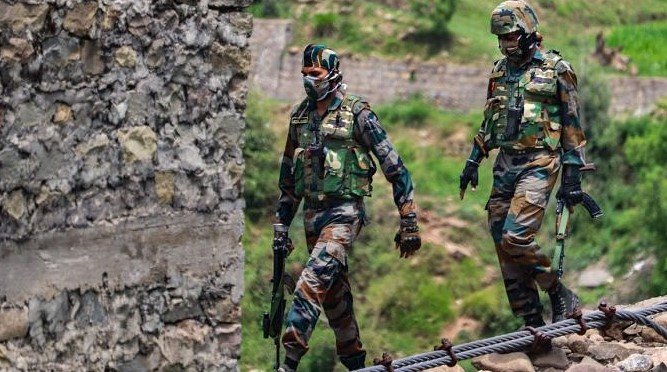Days after key Pahalgam mastermind eliminated in Srinagar, another clash erupts near Deghwar as India steps up anti-terror ops
Indian security forces shot dead two Pakistani terrorists early Wednesday as they attempted to infiltrate through the Line of Control in the Deghwar sector of Poonch, Jammu and Kashmir. It’s the second major gun battle this week — and it signals something big: India’s counter-terror operation tempo is clearly accelerating.
The encounter, which began in the early hours, triggered a large-scale cordon and search operation. Officials believe more infiltrators may be in the vicinity, and reinforcements have been rushed in.
Quiet Morning, Sudden Gunfire
It all started a little after 3 a.m., when forward posts of the Indian Army picked up movement near the LoC. Deghwar, a known infiltration corridor, lies just a few kilometers from the Pakistani border. The terrain is dense. Steep. Forested.
The soldiers were already on high alert, thanks to fresh intelligence inputs. Within minutes, contact was established. A fierce exchange of fire ensued.
By dawn, both infiltrators were neutralized.
“They were carrying assault rifles, grenades, and GPS devices. Clearly trained, well-prepped,” a senior military official told reporters at the site.
One soldier was injured in a landmine explosion during the pursuit. Tragically, another lost his life, triggering a wave of mourning in his native village in Rajasthan.

Not an Isolated Incident — This Week’s Third Major Encounter
This morning’s infiltration bid comes just 36 hours after a high-profile encounter outside Srinagar, where security forces gunned down three terrorists linked to the April 22 Pahalgam massacre. Among them was Suleiman alias Asif — the man India blames for orchestrating that brutal attack, which killed 26 people, mostly tourists.
The Srinagar gunfight, part of “Operation Mahadev”, was triggered by a rare tech intercept. Intelligence agencies tracked a satellite phone signal believed to be used by the Pahalgam attackers.
What they found next shocked them: The trio had slipped into Srinagar city, hiding in a rented house under fake IDs.
The three killed in that operation were:
-
Suleiman alias Asif – alleged mastermind of Pahalgam attack
-
Jibran – reportedly involved in 2024’s Sonamarg Tunnel attack
-
Hamza Afghani – believed to be a Pakistani national, acting as weapons courier
The Arms Cache Tells Its Own Story
Troops recovered a cache of weapons from the slain militants in Srinagar, including:
-
One U.S.-made M4 carbine
-
Two AK-series assault rifles
-
Dozens of grenades
-
Night vision goggles
-
Fake Aadhaar cards and Pakistani SIM cards
Officials believe the firepower and gear were meant for high-value urban attacks — possibly targeting Amarnath pilgrims or crowded marketplaces.
A small paragraph here, just to break things up.
Table: Recent Major Anti-Terror Operations in J&K
| Date | Location | Code Name | Terrorists Killed | Notable Target |
|---|---|---|---|---|
| Jul 30 | Poonch (LoC) | Ongoing Ops | 2 | Infiltration thwarted |
| Jul 29 | Srinagar | Operation Mahadev | 3 | Pahalgam mastermind |
| Jul 25 | Baramulla | NA | 1 | Local recruiter |
| Jul 18 | Rajouri | Op Kargil Flame | 2 | Foreign-trained militants |
Bullet Points: What’s Happening Behind the Scenes?
While the gunfights draw headlines, the real work happens in the background. Sources say the Intelligence Bureau, RAW, and military signals teams have ramped up coordination over the past few weeks.
Here’s what’s driving the shift:
-
Pakistan-based handlers have reportedly activated sleeper cells near Kupwara and Srinagar
-
India is deploying AI-powered motion sensors along known LoC infiltration routes
-
Satellite intercepts are being cross-referenced with human intel on ground
-
A drone surveillance grid now covers 60% of the most-used infiltration tracks
“These are not random encounters. They’re calculated — based on a matrix of data,” said a senior IB officer based in Udhampur.
Political Messaging Is Loud and Clear
The timing of these operations isn’t going unnoticed. Prime Minister Narendra Modi, speaking in Parliament on Tuesday, said: “We avenged the Pahalgam attack in 22 minutes.” The remark was met with applause from Treasury benches, and sharp pushback from the opposition.
Union Home Minister Amit Shah, who’s expected to address Parliament again today, called the Srinagar operation “a surgical blow” to Pakistan-backed terror networks.
Congress, meanwhile, is demanding an all-party briefing.
“Security should unite us, not divide us,” said Priyanka Gandhi, who also criticized Shah for “politicising grief”.
But within security circles, there’s little room for politics right now. They’re focused on sanitizing the Deghwar zone — and tracking the next cell.
What’s Next?
Military commanders expect infiltration attempts to spike in August as militants try to sneak in before snowfall makes LoC crossings impossible. This aligns with previous years’ patterns — 2016, 2019, and 2022 all saw summer surges in infiltration.
“This isn’t over. It’s just beginning,” said an officer from the 24 Rashtriya Rifles, standing near the muddy, pine-covered ridge where Wednesday’s encounter took place.
As search operations continue into the evening, helicopters buzz overhead and soldiers comb the underbrush, one thing is clear: India’s security grid is no longer reactive — it’s hunting.
